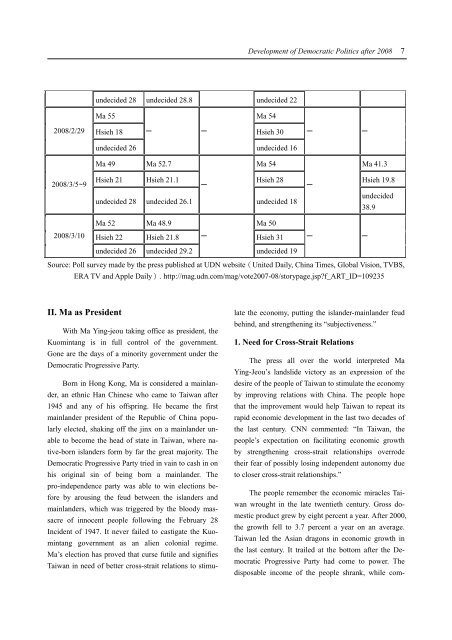PDF(2.7mb) - 國家政策研究基金會
PDF(2.7mb) - 國家政策研究基金會
PDF(2.7mb) - 國家政策研究基金會
You also want an ePaper? Increase the reach of your titles
YUMPU automatically turns print PDFs into web optimized ePapers that Google loves.
Development of Democratic Politics after 2008 7<br />
undecided 28 undecided 28.8 undecided 22<br />
Ma 55 Ma 54<br />
2008/2/29<br />
Hsieh 18 ─<br />
─<br />
Hsieh 30<br />
─<br />
─<br />
undecided 26<br />
undecided 16<br />
Ma 49 Ma 52.7 Ma 54 Ma 41.3<br />
2008/3/5~9<br />
Hsieh 21 Hsieh 21.1<br />
─<br />
Hsieh 28<br />
─<br />
Hsieh 19.8<br />
undecided 28 undecided 26.1<br />
undecided 18<br />
undecided<br />
38.9<br />
Ma 52 Ma 48.9 Ma 50<br />
2008/3/10 Hsieh 22 Hsieh 21.8 ─<br />
Hsieh 31 ─<br />
─<br />
undecided 26 undecided 29.2<br />
undecided 19<br />
Source: Poll survey made by the press published at UDN website(United Daily, China Times, Global Vision, TVBS,<br />
ERA TV and Apple Daily). http://mag.udn.com/mag/vote2007-08/storypage.jsp?f_ART_ID=109235<br />
II. Ma as President<br />
With Ma Ying-jeou taking office as president, the<br />
Kuomintang is in full control of the government.<br />
Gone are the days of a minority government under the<br />
Democratic Progressive Party.<br />
Born in Hong Kong, Ma is considered a mainlander,<br />
an ethnic Han Chinese who came to Taiwan after<br />
1945 and any of his offspring. He became the first<br />
mainlander president of the Republic of China popularly<br />
elected, shaking off the jinx on a mainlander unable<br />
to become the head of state in Taiwan, where native-born<br />
islanders form by far the great majority. The<br />
Democratic Progressive Party tried in vain to cash in on<br />
his original sin of being born a mainlander. The<br />
pro-independence party was able to win elections before<br />
by arousing the feud between the islanders and<br />
mainlanders, which was triggered by the bloody massacre<br />
of innocent people following the February 28<br />
Incident of 1947. It never failed to castigate the Kuomintang<br />
government as an alien colonial regime.<br />
Ma’s election has proved that curse futile and signifies<br />
Taiwan in need of better cross-strait relations to stimulate<br />
the economy, putting the islander-mainlander feud<br />
behind, and strengthening its “subjectiveness.”<br />
1. Need for Cross-Strait Relations<br />
The press all over the world interpreted Ma<br />
Ying-Jeou’s landslide victory as an expression of the<br />
desire of the people of Taiwan to stimulate the economy<br />
by improving relations with China. The people hope<br />
that the improvement would help Taiwan to repeat its<br />
rapid economic development in the last two decades of<br />
the last century. CNN commented: “In Taiwan, the<br />
people’s expectation on facilitating economic growth<br />
by strengthening cross-strait relationships overrode<br />
their fear of possibly losing independent autonomy due<br />
to closer cross-strait relationships.”<br />
The people remember the economic miracles Taiwan<br />
wrought in the late twentieth century. Gross domestic<br />
product grew by eight percent a year. After 2000,<br />
the growth fell to 3.7 percent a year on an average.<br />
Taiwan led the Asian dragons in economic growth in<br />
the last century. It trailed at the bottom after the Democratic<br />
Progressive Party had come to power. The<br />
disposable income of the people shrank, while com-

















